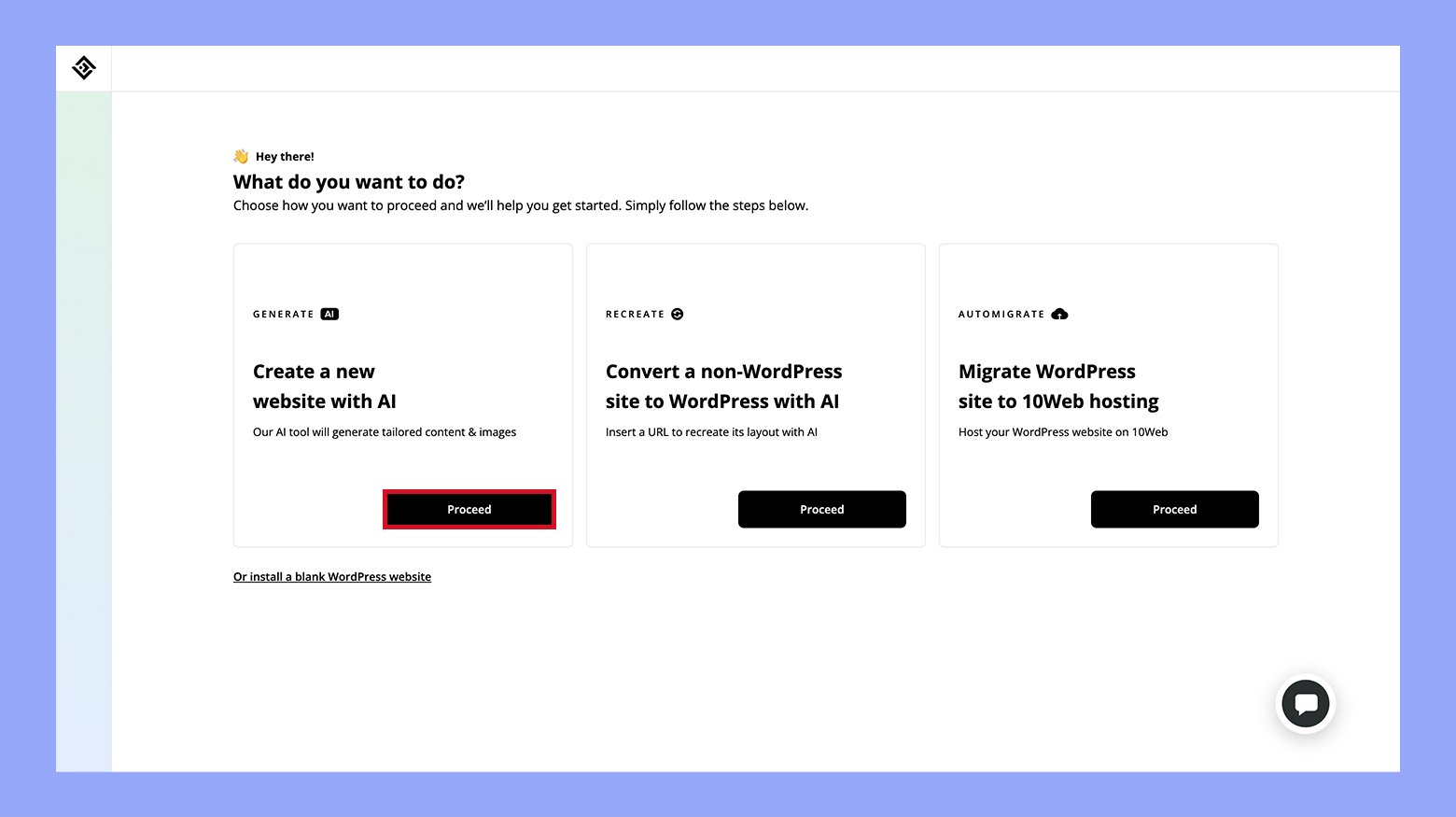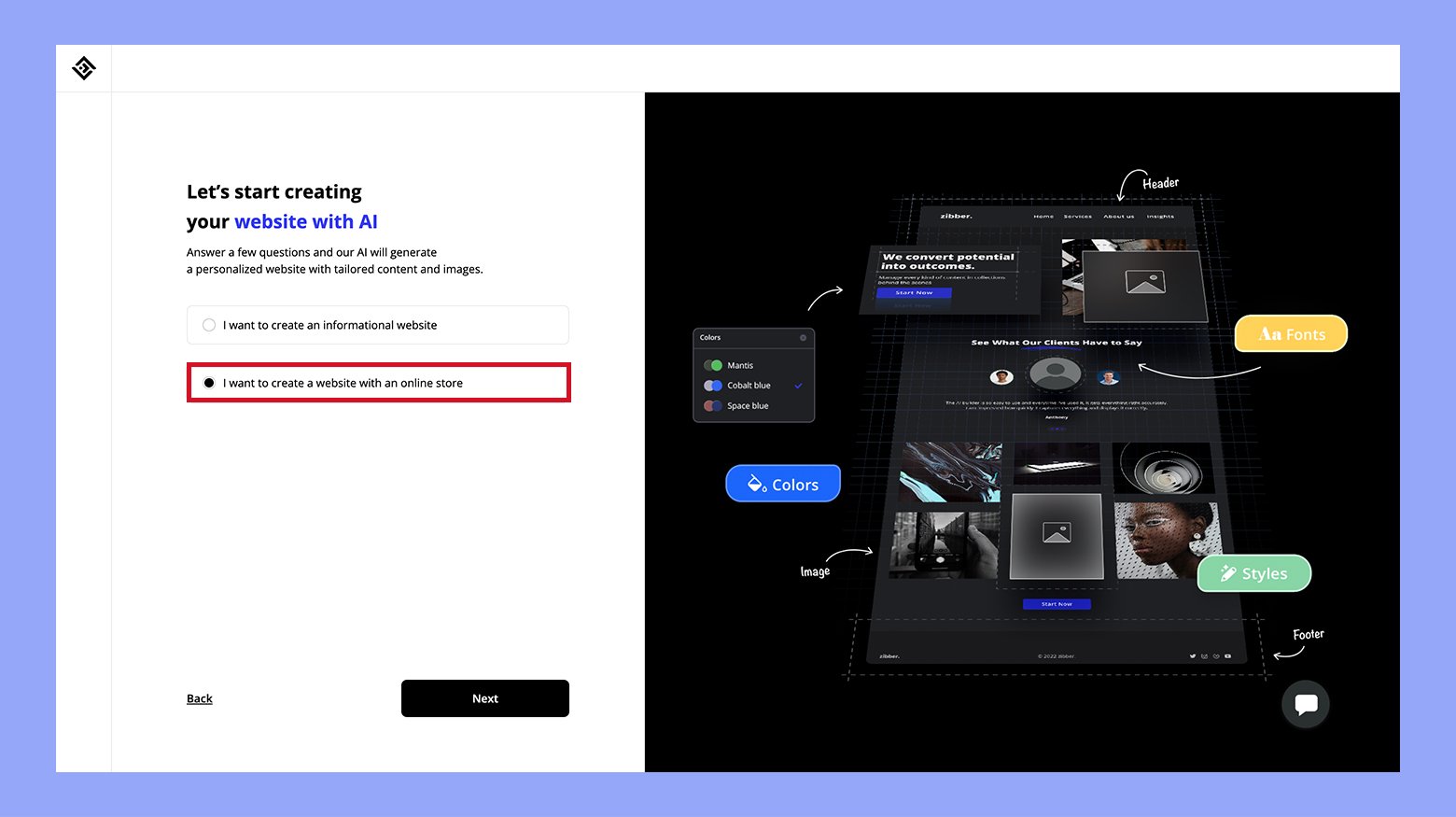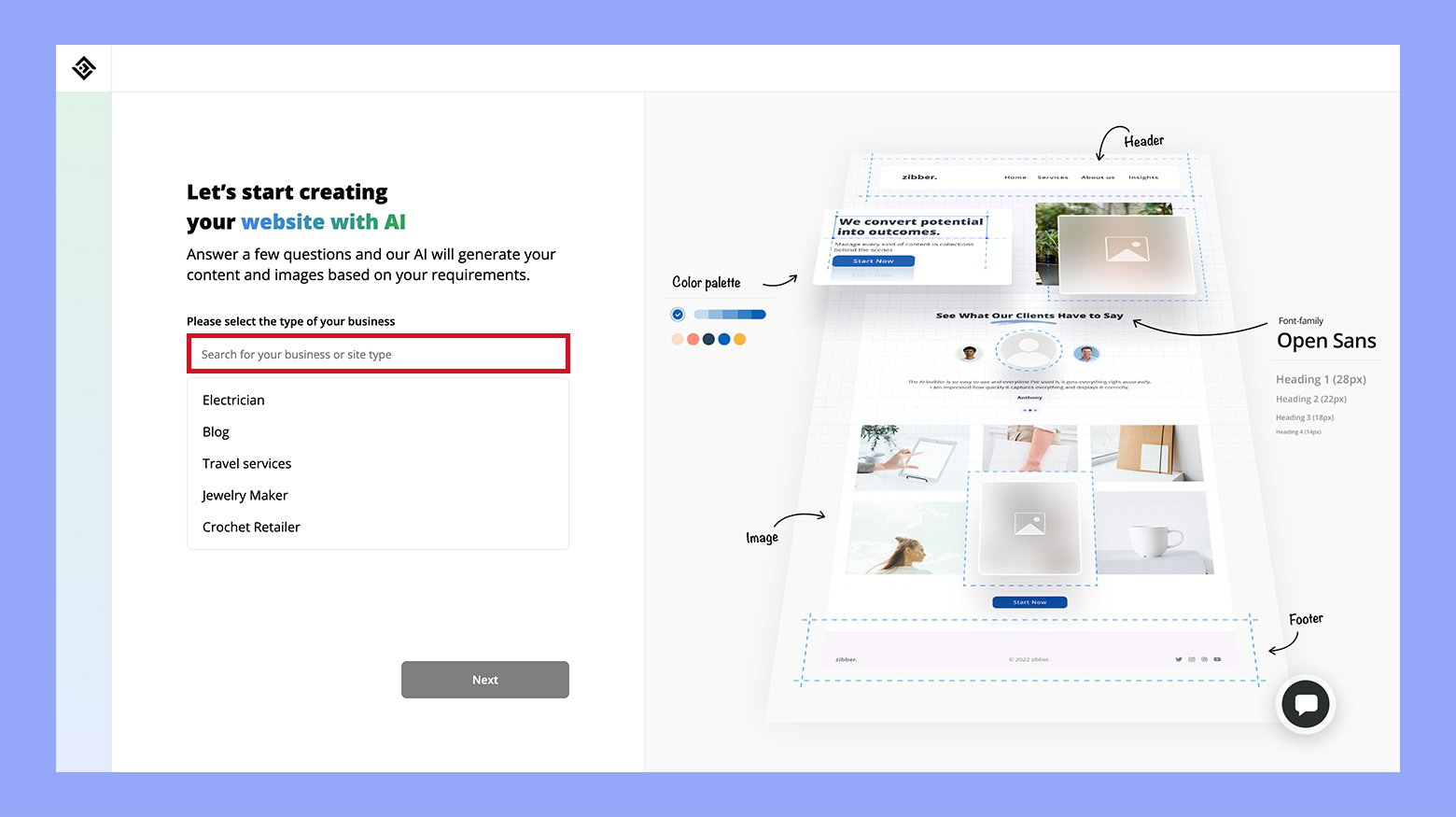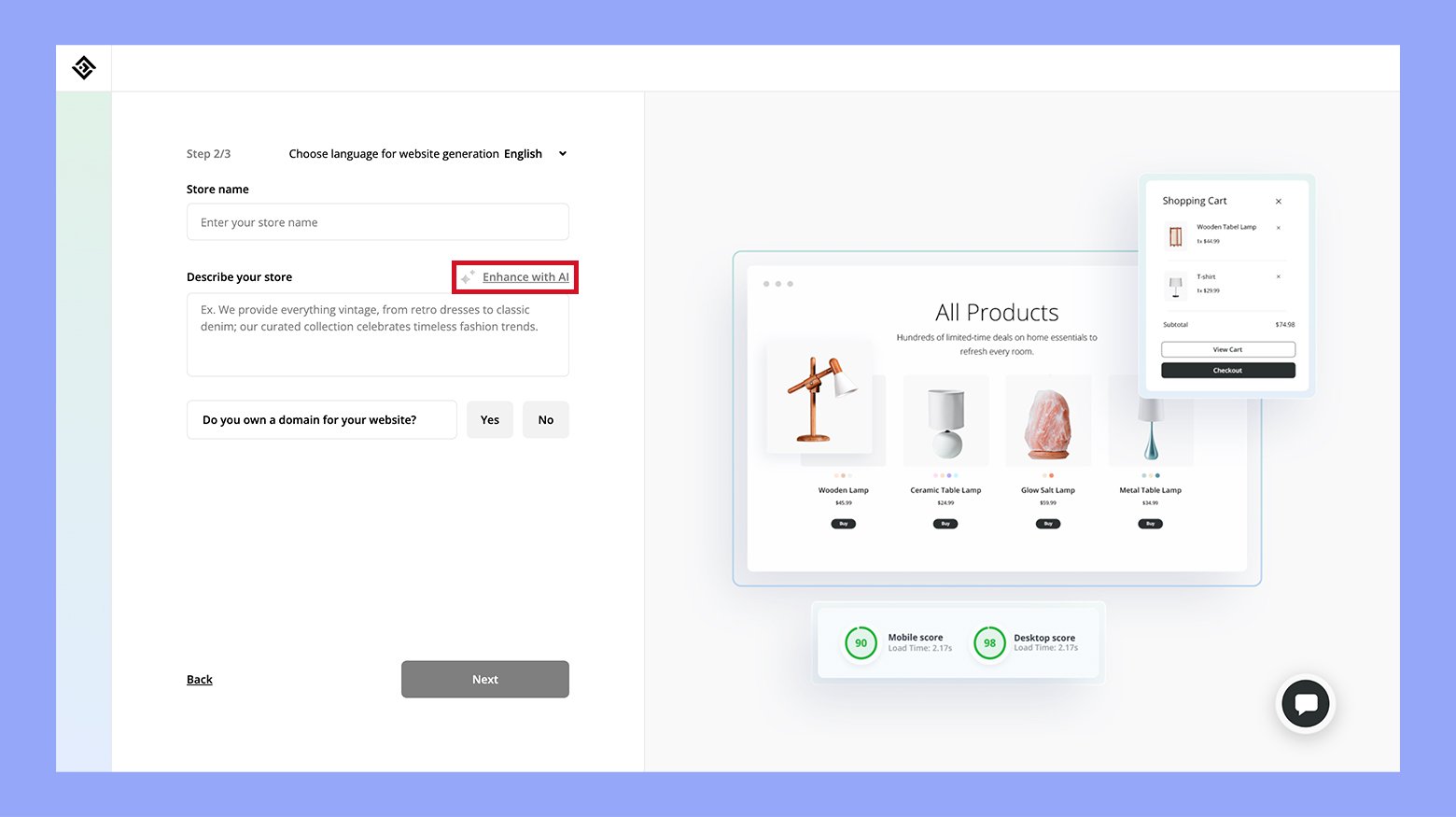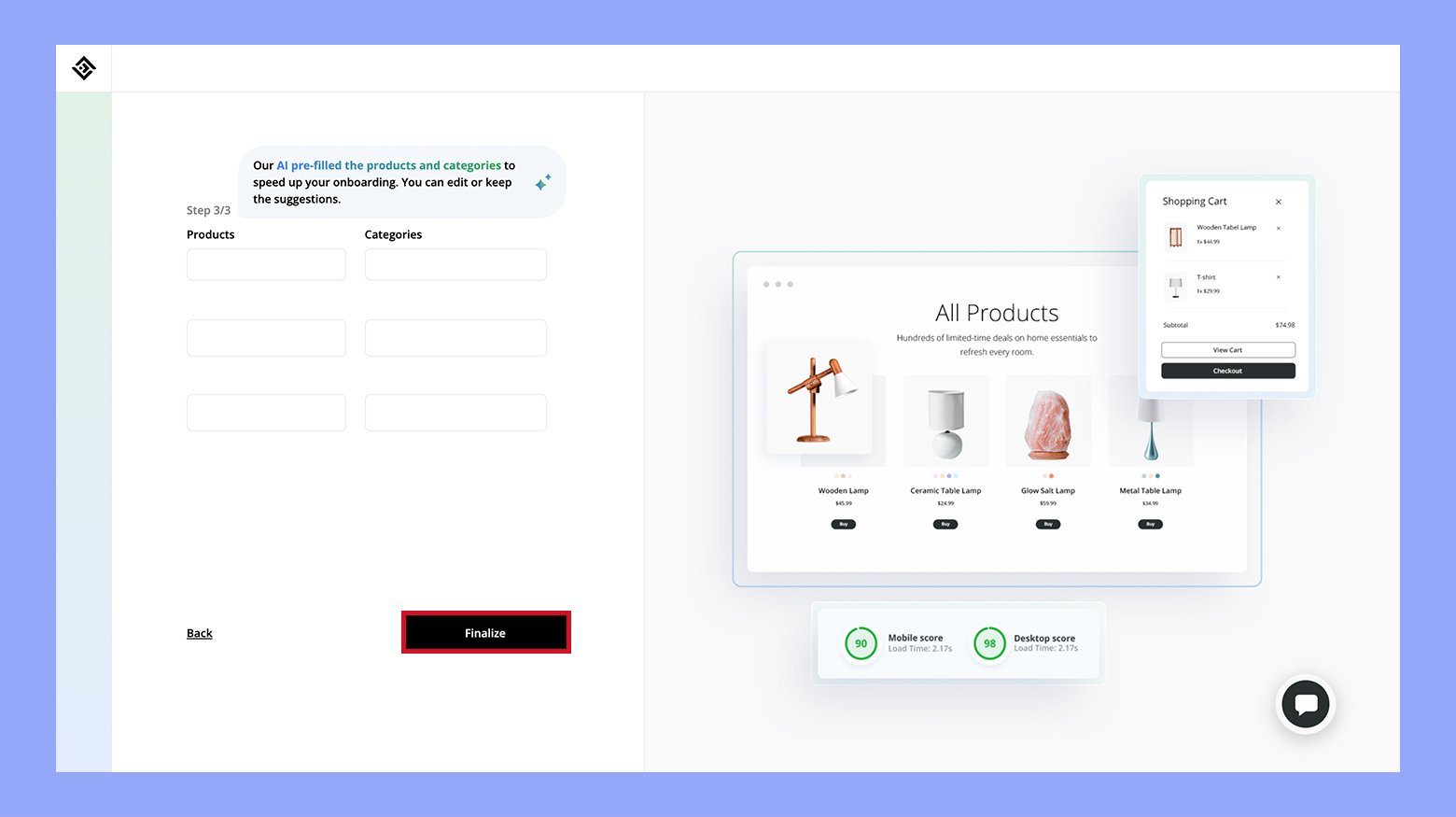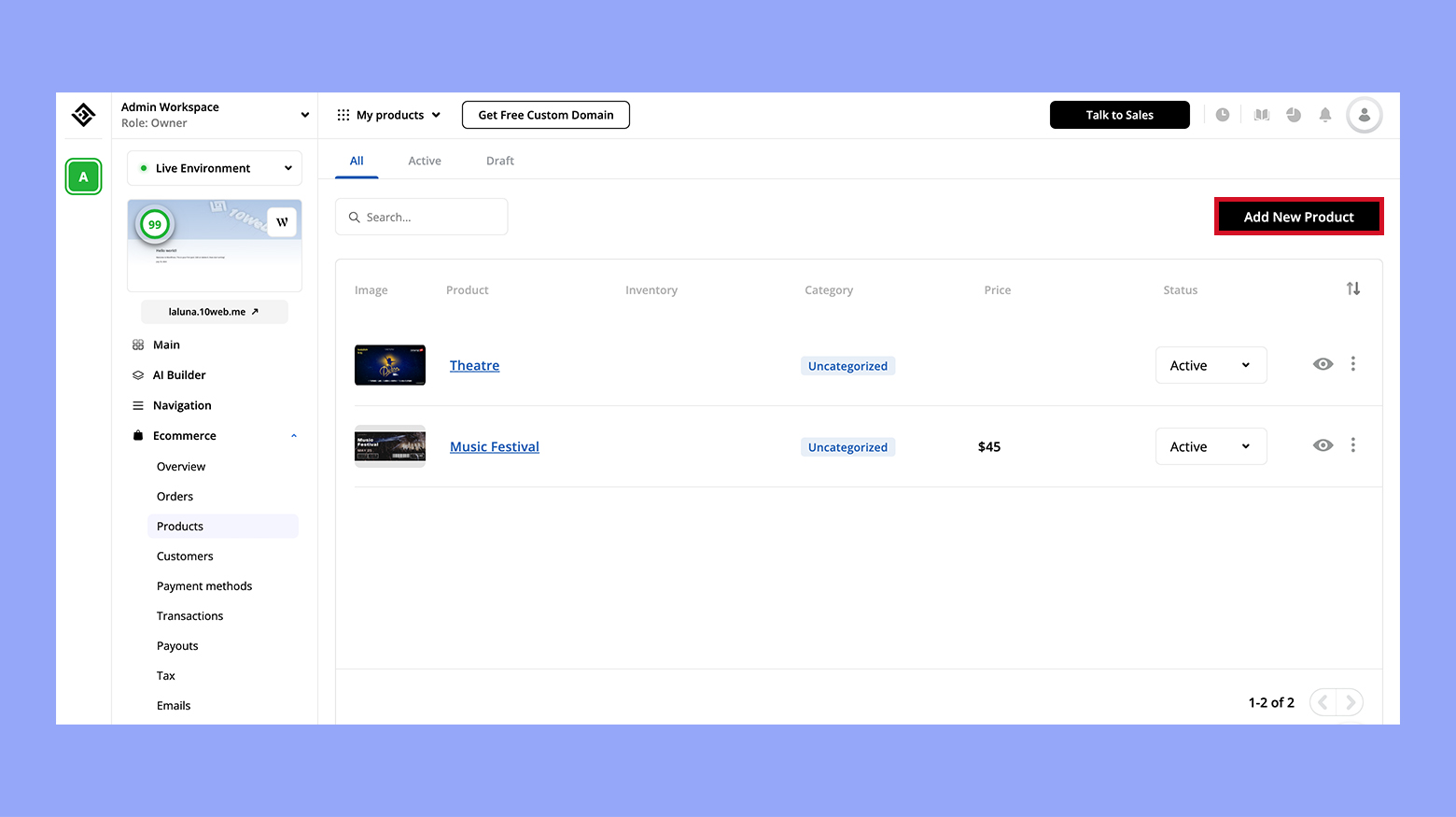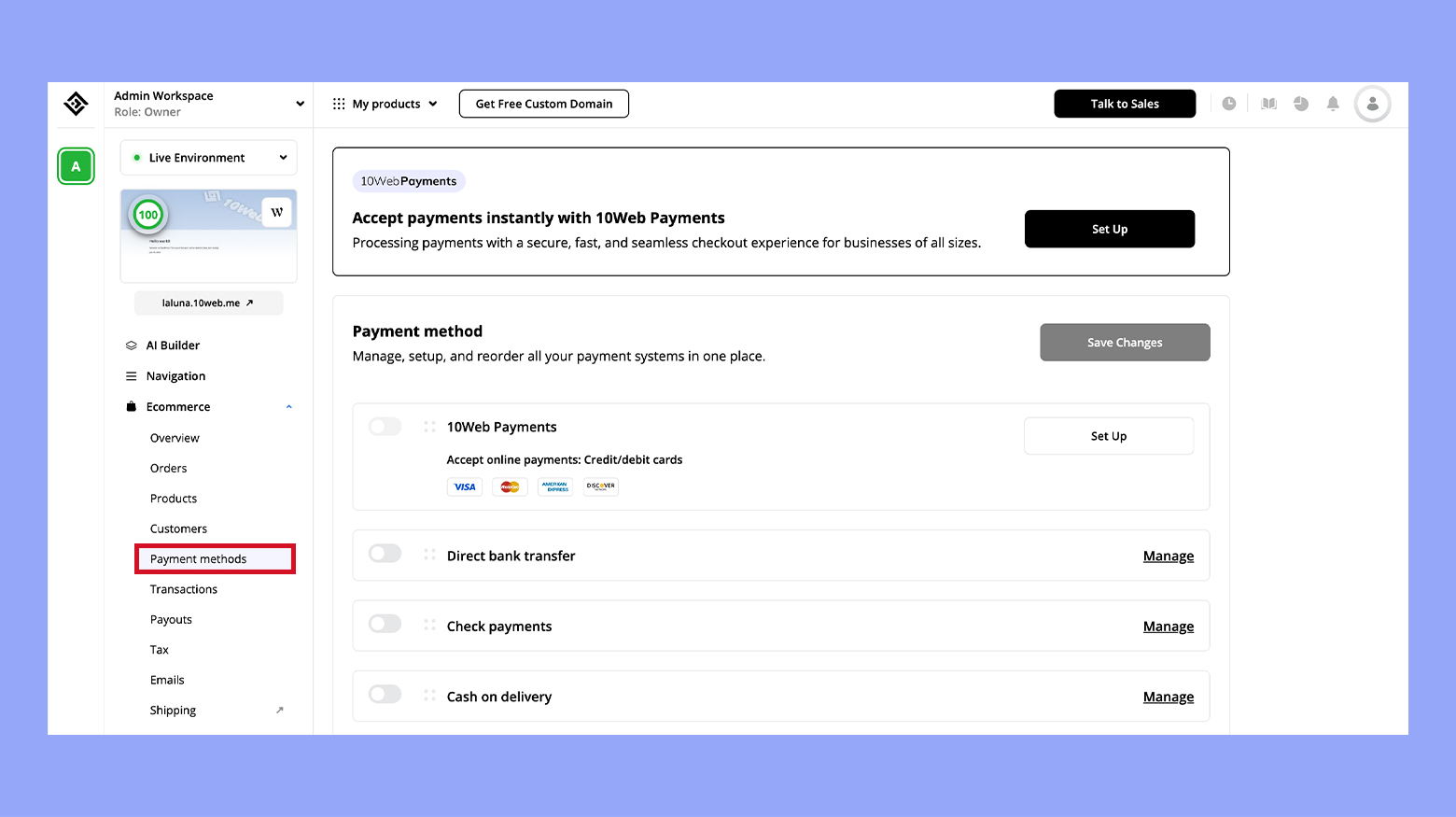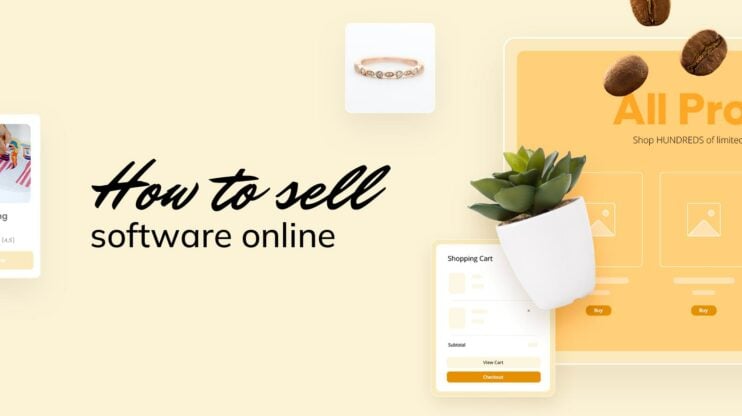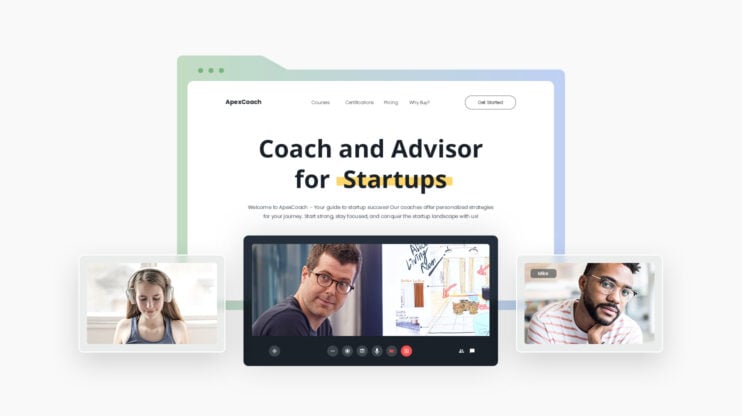Selling tickets online opens up a world of opportunities, but it also demands a strategic approach to overcome the complexities of the digital marketplace. Whether you’re an event organizer, a wholesale distributor, or a retailer, understanding your specific sales objectives is crucial for success. This guide aims to provide beginners with a comprehensive roadmap to selling tickets online, highlighting key challenges and opportunities for different types of ticket sellers. By defining your goals and adopting effective strategies, you can maximize your reach and revenue in the competitive online ticketing industry.
FAQ
What is the easiest site to sell tickets on?
How do I sell my tickets electronically?
Is it legal to resell tickets online?
Defining your ticket sales objectives
When selling tickets online, your goals will vary depending on whether you’re creating a new platform or integrating ecommerce into an existing website. Identifying your specific needs is crucial for shaping your online strategy.
Seller type 1: Event organizers going online
As an event organizer, you plan, manage, and sell tickets for various events, such as concerts, conferences, and sports games. You handle everything from ticket design to sales and distribution, often working directly with consumers.
Event organizers have a unique position in the online ticket market. Having a clear unique selling proposition (USP) and showcasing your event’s uniqueness directly to a global audience are key factors for success.
Challenges:
- Standing out: Differentiating your brand in a crowded digital marketplace.
- Maintaining authenticity: Ensuring the integrity of your brand online to build and retain customer trust.
- Investing in infrastructure: Developing a robust ecommerce platform and effective marketing strategies to reach your target audience.
Opportunities:
- Collaborations: Partnering with influencers and celebrities to boost brand recognition through special promotions or limited-edition tickets.
- Direct sales: Selling tickets directly to consumers to increase profit margins and build customer relationships.
- Minimizing unused inventory: Offering discounts on unsold tickets to reach a broader audience.
- Reducing costs: Lowering expenses associated with physical ticket sales and brick-and-mortar operations.
Seller type 2: Ticket distributors
As a ticket distributor, you purchase tickets in bulk from event organizers and sell them to retailers or directly to consumers. You play a vital role in the supply chain, ensuring that retailers and consumers have access to a variety of event tickets.
Ticket distributors are critical in the online ticket market. Having an extensive network and offering a wide variety of tickets can lead to significant success.
Challenges:
- Competing in a saturated market: Differentiating your offerings and attracting retailers in a competitive digital space.
- Supply chain management: Ensuring efficient inventory control and timely delivery to meet retailer demands.
- Investing in ecommerce: Building a strong online presence and reaching target retailers requires significant investment in technology and marketing.
Opportunities:
- Global reach: Accessing a worldwide market of retailers and consumers looking for reliable ticket suppliers.
- Bulk discounts: Attracting more retailers by offering competitive pricing and bulk purchase discounts.
- Data analytics: Using online tools to gather insights on market trends and preferences, optimizing inventory and marketing strategies.
- Reducing operational costs: Lowering traditional sales and warehousing costs by optimizing online operations.
Seller type 3: Retailers
Retailers sell tickets directly to the public, either through physical stores or online platforms. You curate a selection of tickets from various suppliers to offer to your customers, focusing on providing an excellent shopping experience.
Ticket retailers have a unique opportunity in the online market. Curating a diverse selection of tickets and providing a seamless shopping experience can help attract a wide range of customers.
Challenges:
- Standing out: Differentiating your store from numerous other online ticket retailers.
- Ensuring customer experience: Providing a user-friendly website and exceptional customer service to build trust and loyalty.
- Investing in infrastructure: Developing an effective online presence and reaching your target audience requires significant investment in technology and marketing.
Opportunities:
- Broader audience: Expanding your customer base beyond your local area by selling online.
- Targeted marketing: Using social media, email campaigns, and SEO to attract and retain customers.
- Diverse product range: Curating a variety of tickets from different suppliers to cater to various tastes and preferences.
- Reducing overhead costs: Lowering expenses associated with maintaining a physical store by optimizing online operations.
Understanding today’s market
The market landscape is continuously evolving, shaped by trends, technological advancements, and consumer preferences. Understanding these factors is crucial for making informed decisions.
- Trends: Stay updated on current trends to remain competitive, including shifts towards online sales and personalized experiences.
- Competition: Analyze your competitors to identify their strengths and weaknesses, helping you effectively position your products and services.
- Consumer behavior: Recognize that consumers increasingly prefer convenient, personalized experiences. Quality and reliability are significant factors influencing purchasing decisions.
- Technology: Leverage ecommerce platforms, social media, and digital marketing tools to expand your reach. Technology also plays a vital role in enhancing inventory management and customer engagement.
Option 1: Making your own online store
Creating your own online store allows you to gain control over your sales, customer interactions, and branding. It is a great way to sell tickets online without relying on third-party platforms.
The benefits of creating your own online shop
Having your own online store gives you complete control over the pricing and presentation of your tickets. This allows you to maximize profits by setting competitive prices and avoiding platform fees.
Additionally, managing a store on your own allows for better data collection on customer behaviors and preferences. This can help tailor your marketing strategies to boost ticket sales.
Creating your own store also opens up the possibility for seamless payment processing, better technology integration, and customized user experiences.
How to create an online store using 10Web Builder
Using tools like 10Web Builder makes setting up an online store easy. Follow these steps to get started:
- Go to the 10Web Ecommerce Website Builder page and click Generate your website.
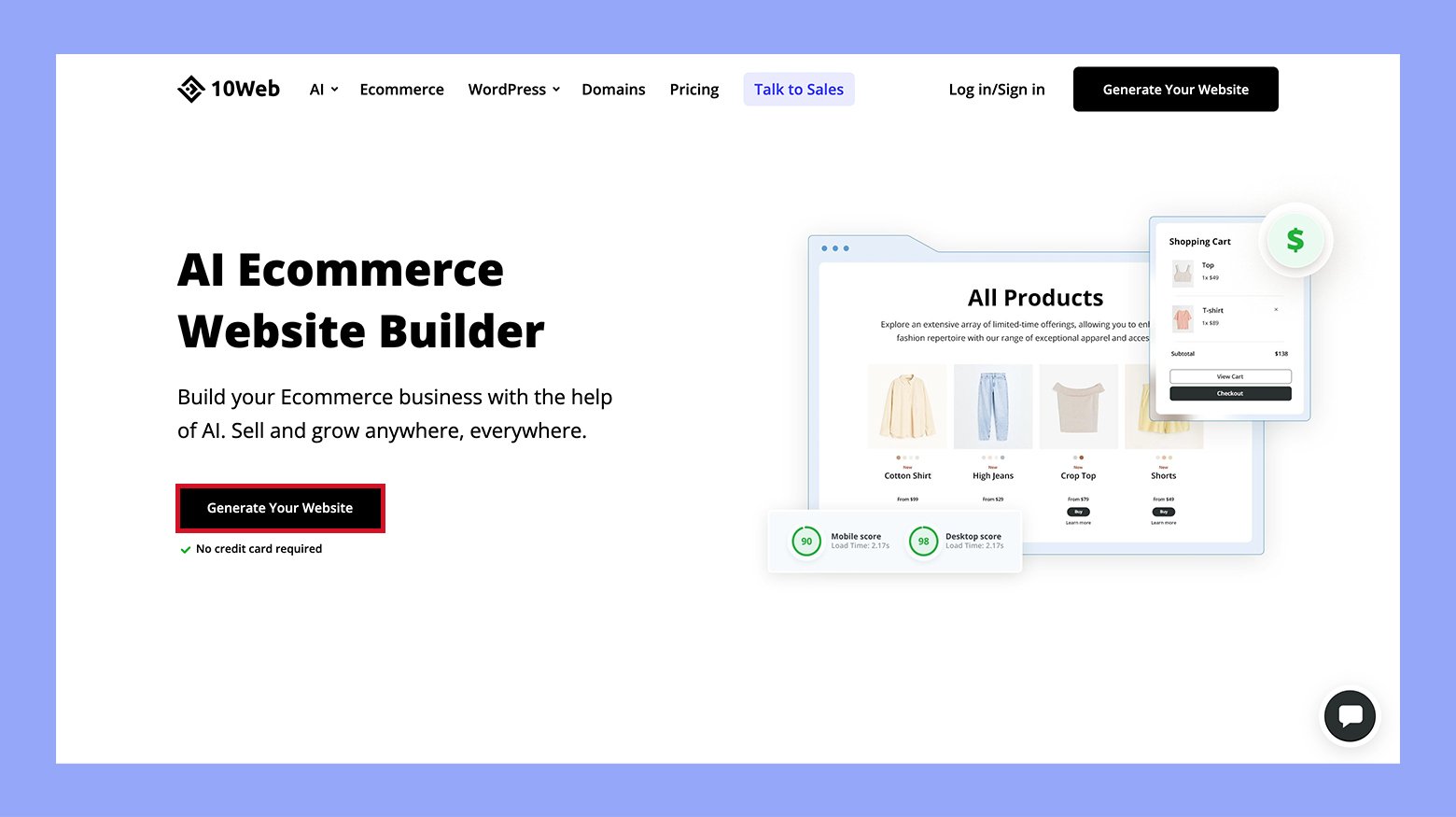
- Select Proceed to create a new website with AI.

- Choose the second option to create a website with an online store.

- Enter your business type.

- Provide a business name and description.Use the Enhance with AI tool if needed.

- Choose Yes to get a domain or click No if you have one already.
- Enter details for your first three services and categories. AI will pre-fill them for you, you can edit or keep the suggestions. When done, click Finalize, and wait for 10Web to generate your site.

- Once your site is generated, preview it and make any necessary adjustments using the user-friendly tools provided by 10Web.
- Afterward, you can edit your website and add any page or product you like.

- Design your ticket page with details, pricing, and pictures.
- Set up a payment gateway for secure transactions.

- Review and test the online store to ensure everything works smoothly.
10Web Builder simplifies these tasks with drag-and-drop features, so you don’t need any coding skills to create an appealing store.
Tips to promote your online store
Promoting your online store is crucial to attract customers. Start by leveraging social media platforms. Posting regular updates and running targeted ads can drive traffic to your store.
Consider partnering with influencers to reach a broader audience. Share discount codes and exclusive offers to create a buzz around your event.
Use email marketing to stay in touch with customers. Send newsletters with updates, promotions, and reminders about upcoming events.
Optimize your website for search engines by using relevant keywords in your content. This helps potential customers find your store more easily when searching online.
Monitor your store’s performance and make data-driven decisions to continually improve and grow your ticket sales.

Looking to sell online?
Create your custom online store in minutes with 10Web AI Ecommerce Website Builder and take your business online.
Option 2: Selling on online marketplaces
Selling tickets online can be easy if you use the right tools and know how to navigate different platforms. Understanding the benefits and potential downsides, discovering the best places to sell, and applying some useful tips will help you achieve success.
Advantages and disadvantages of selling on online marketplaces
Advantages:
- Large audience: Online marketplaces give you access to millions of potential buyers.
- Ease of use: These platforms are designed to make listing your tickets simple.
- Payment security: Many marketplaces offer secure payout methods, reducing the risk of fraud.
- Flexibility: You can list a variety of events and tickets.
Disadvantages:
- Commission fees: Many marketplaces charge a commission or service fee for each sale.
- Competition: There might be a lot of other sellers, making it harder to stand out.
- Rules and restrictions: Some platforms have strict policies that can limit how you sell your tickets.
Best places to sell your products online
TickPick makes selling tickets straightforward. You can click the Sell Tickets button, type the event name, and list your tickets. TickPick is known for its user-friendly interface and lower fees.
Selling on SeatGeek is easy both on their website and via their app. You can list your tickets quickly by clicking the Sell button or tapping the Sell icon in the app. SeatGeek reaches a large audience with minimal fees.
Tips to successfully sell on an online marketplace
- Create accurate listings: Provide all necessary details such as section, row, and seat numbers.
- Set competitive prices: Research similar listings to price your tickets competitively.
- Utilize high-quality photos: Include clear images of the tickets when possible.
- Choose secure payment methods: Opt for secure payout methods like bank deposits to ensure you receive your money.
- Respond promptly: Engage with buyers quickly to answer any questions and close sales faster.
By following these guidelines, you’ll improve your chances of successfully selling your tickets on online marketplaces.
Option 3: Selling on social media
Selling tickets on social media can greatly boost your sales and visibility. You’ll reach a wider audience and enjoy high engagement, but it’s important to balance this with using other platforms.
Benefits of selling on social media
Social media platforms like Facebook and Instagram have billions of users globally. This wide reach means you can sell tickets to a diverse audience. Engaging posts, videos, and stories keep potential buyers interested. You can use targeted ads to reach individuals who are more likely to attend your event.
Additionally, social media allows you to interact with your audience in real-time. You can quickly answer questions, provide updates, and build a community around your event. Using social proof, such as testimonials and user-generated content, can help build trust and encourage purchases.
Disadvantages of selling only on social media
While social media is a powerful tool, relying solely on it can have downsides. Not everyone uses social media regularly, so you might miss out on potential buyers who prefer other platforms. Algorithms can change, which might reduce the visibility of your posts without warning.
Furthermore, social media sales can require constant monitoring and updating. It can be time-consuming to create engaging content, respond to messages, and manage ads. If your target audience is more niche or local, they may not be best reached through social media alone.
Tips to sell on social media
- Use high-quality images and videos: These grab attention and increase engagement.
- Run targeted ads: Platforms allow you to specify demographics, locations, interests, and behaviors.
- Engage with your audience: Respond to comments and messages quickly to build rapport.
- Create a sense of urgency: Use countdowns and limited-time offers to encourage quick purchases.
- Leverage influencers: Collaborate with social media influencers or artists who can promote your event.
By following these tips, you can make the most out of selling on social media while minimizing the pitfalls.
Ticket sales strategies
Selling tickets online can seem complicated, but with the right tools and strategies, it becomes much easier. This section covers effective methods to sell tickets online and ways to maximize your earnings from ticket resale.
How to sell tickets online
- Create a compelling event page: An attractive, detailed event page can drive more ticket sales. Include all necessary information like date, time, venue, and special guests. High-quality images and videos can also capture people’s attention.
- Use social media marketing: Promote your event on various social media platforms. Engaging posts, event pages, and paid ads can reach a wider audience. Share the event link frequently and encourage attendees to share it too.
- Offer mobile-optimized purchasing: Ensure that your ticketing platform is mobile-friendly. With 60% of all ecommerce sales happening on cell phones, mobile optimization is key.
- Email marketing: Use your mailing list to send targeted email campaigns. Offer exclusive early-bird discounts or special incentives to motivate potential attendees.
- Leverage influencers and partnerships: Collaborate with influencers or partner with other brands to expand your reach. They can help promote your event to a larger audience.
Recommendation
Whether you’re an event organizer, a wholesale distributor, or a retailer, you can choose the option best fitting your goals. For event organizers looking to go online, we recommend exploring option 1, which involves creating your online ticket store to build a strong brand by selling tickets directly. Option 2 leverages third-party platforms like Eventbrite, while option 3 focuses on social media platforms like Instagram and Facebook to reach a wider audience and engage with potential customers directly. Each option has its unique benefits and can be tailored to fit your specific needs and objectives.
Maximizing earnings from ticket resale
- Buy low, sell high: The main strategy for ticket resale is to purchase tickets at their face value and resell them for a profit. Look for events with high demand such as popular concerts, sports events, or theater shows.
- List your tickets on multiple platforms: Use platforms like TickPick or StubHub to list your tickets. Autolist features can help streamline the process. More listings increase the chances of selling your tickets.
- Set a competitive price: Research current market prices and set your selling price accordingly. Offering slightly lower prices than competitors can help attract ticket buyers.
- Offer e-tickets: Digital tickets are easier to manage and transfer. Platforms like Ticketmaster allow you to issue verified resale tickets, ensuring buyers security and convenience.
- Respond quickly to inquiries: Keep an eye on your accounts and respond promptly to potential buyers. Quick communication can secure a sale faster.
- Monitor price fluctuations: The ticket resale market is dynamic, meaning prices can change. Adjust your prices to match current trends and maximize your profit margin.
By following these steps, you can effectively sell and resell tickets online, ensuring a profitable and smooth-selling experience.
Pricing strategies for sellers
When selling tickets online, setting the right prices and adjusting them based on demand are crucial to maximize your sales and revenue. This involves understanding your market, monitoring competitors, and using effective tools and strategies.
How to set competitive prices
Setting competitive prices requires research and careful planning. Start by looking at the face value of tickets and comparing those prices on various platforms and ticket marketplaces.
- Research competitors: Check what similar events are charging.
- Use historical data: Examine past events to see pricing trends.
- Factor in commission: Consider the commission taken by ticket selling platforms and apps. This can affect your profit margins.
- Add value: Offer early bird discounts or VIP packages to attract different segments of buyers.
Remember, pricing too high might discourage sales, and pricing too low can undervalue your event. Tailor your strategy based on the specifics of your event and audience.
Ways to adjust prices based on demand
Adjusting prices according to demand can optimize revenue. If an event is popular, you can increase the price gradually as tickets sell out. Conversely, if ticket sales are slow, consider discounts or promotions.
- Monitor sales: Keep a close eye on how tickets are selling. Many platforms offer tools to track this in real-time.
- Dynamic pricing: Use dynamic pricing tools to automatically adjust prices based on demand. Many apps provide this feature.
- Offer limited-time discounts: Create urgency with flash sales or limited-time offers.
- Bundle deals: Combine tickets with other offers, like merchandise or food vouchers, to add value.
Adjusting prices smartly can ensure you are always aligned with demand, optimizing both sales and customer satisfaction.

Looking to sell online?
Create your custom online store in minutes with 10Web AI Ecommerce Website Builder and take your business online.
Customer engagement and support
Engaging with your customers and providing top-quality support are vital for selling tickets online. They help build loyalty, encourage repeat purchases, and create positive word-of-mouth.
Best practices for enhancing customer experience
To boost customer experience, start by making your website user-friendly. This includes clear navigation, quick loading times, and mobile responsiveness. Make sure the ticket purchasing process is simple and intuitive. Adding features like real-time seat selection and multiple payment options can make buying tickets even easier.
Inform your customers about event details through email reminders and push notifications via your app. Providing accurate and timely information builds trust.
Offer special perks like early bird discounts and loyalty rewards. Personalize communication by addressing customers by name and suggesting events based on their past purchases. This makes each buyer feel valued and understood.
Support channels for your buyers
Providing multiple support channels ensures that your ticket buyers can easily reach out for help. A live chat feature on your website or app offers immediate assistance and can resolve issues quickly. Email support is also essential; ensure you respond within 24 hours to maintain trust.
Use social media platforms for support, where your team can engage directly with customers. Social media is also great for handling public queries or concerns transparently.
Offer a comprehensive FAQ section on your website, addressing common questions about service fees, ticket types, and refund policies. This helps reduce the load on your support team and provides immediate answers to buyers.
Lastly, having a phone support option can make a significant difference for those who prefer speaking directly to a representative. This human touch can often resolve complex issues more effectively.
Legalities in ecommerce
Selling tickets online involves understanding and adhering to various laws and regulations. These legalities ensure that your business remains compliant and your customers are protected.
Understanding resale laws and regulations
When reselling tickets, it’s crucial to know the laws in your area. Different regions have varying rules about ticket resale. In certain places, reselling tickets is restricted or even illegal without proper authorization.
For instance, some areas require you to disclose the original price of the ticket. This transparency helps prevent fraud. Additionally, regions may have strict rules about how much markup you can add to the resale price. Violating these regulations can result in hefty fines.
If you’re using platforms like Ticketmaster or Eventbrite, they often have their own set of guidelines. Make sure to follow these to avoid any penalties or account suspensions.
Maintaining compliance when selling tickets
To stay compliant when selling tickets online, you must follow several steps. Use reputable payment gateways such as PayPal to protect buyer information and avoid fraud. Make sure your online marketplace meets local data protection standards to ensure all transactions are secure.
It’s essential to provide clear and accurate information about the tickets. Avoid misleading advertising to protect your customers and your business legally. Properly inform customers about replacement fees if the ticket is lost or stolen. This ensures transparency and builds trust.
Moreover, some regions might require you to use verified resale tickets to prove authenticity. Always provide receipts and transaction records to customers to maintain a clear paper trail and comply with any audits or disputes that arise.
Conclusion
The online ticketing industry presents a dynamic and profitable opportunity for event organizers, distributors, and retailers. By clearly defining your sales objectives and understanding the unique challenges and opportunities, you can effectively navigate the digital marketplace. Utilizing robust ecommerce platforms, engaging in targeted marketing strategies, and maintaining excellent customer support will enhance your online presence and drive sales. With a strategic approach and the right tools, you can achieve long-term success in the online ticketing industry, reaching a global audience and maximizing your profits.


